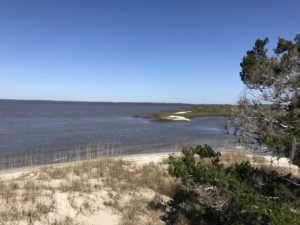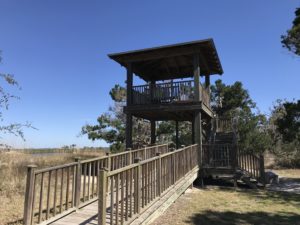 One of the last things we did before Mom and Dad headed back to Ohio was visit the Wanderer Memory Trail on Jekyll Island. Mom saw a blurb on it in one of the coastal “Things to Do” magazines. So, after riding bikes one day, we headed to the south end of Jekyll Island to check out the trail.
One of the last things we did before Mom and Dad headed back to Ohio was visit the Wanderer Memory Trail on Jekyll Island. Mom saw a blurb on it in one of the coastal “Things to Do” magazines. So, after riding bikes one day, we headed to the south end of Jekyll Island to check out the trail.
The Wanderer was one of the last ships to bring slaves to the United States. Importing slaves from Africa was banned by Congress in 1808. Slave traders and owners in the south continued the practice long after that. In 1820 Congress strengthened the law by making the practice punishable by death. British ships patrolled the shores of Africa and American Navy ships patrolled the shores of the United States. Despite these precautions, however, Savannah businessman Charles Lamar hired Captain James Corrie and his ship, the Wanderer, to bring in a load of slaves in 1858. The slave ship landed on Jekyll Island and was impounded by the US Attorney General.
The case against Charles Lamar came to trial in 1860. Lamar and the crew of the ship were acquitted. Some of the slaves were sold or traded illegally and some were returned to Africa.
 The Wanderer Memory Trail is an interactive trail that talks about life in Africa and the journey to the United States in a slave ship. You can push buttons to hear slave songs or stories told by the descendants of survivors. One station has “musical instruments” played by slaves. A beautiful platform rises above the marsh grasses for a great view of the inter-coastal waterway.
The Wanderer Memory Trail is an interactive trail that talks about life in Africa and the journey to the United States in a slave ship. You can push buttons to hear slave songs or stories told by the descendants of survivors. One station has “musical instruments” played by slaves. A beautiful platform rises above the marsh grasses for a great view of the inter-coastal waterway.
The Wanderer Memory Trail is half a mile long. The trail is a great way to remember the difficult journey made by many Africans to come to America. The acquittal of all the men involved in this illegal trade reminds us that inequity in our “justice” system is not a new problem.
